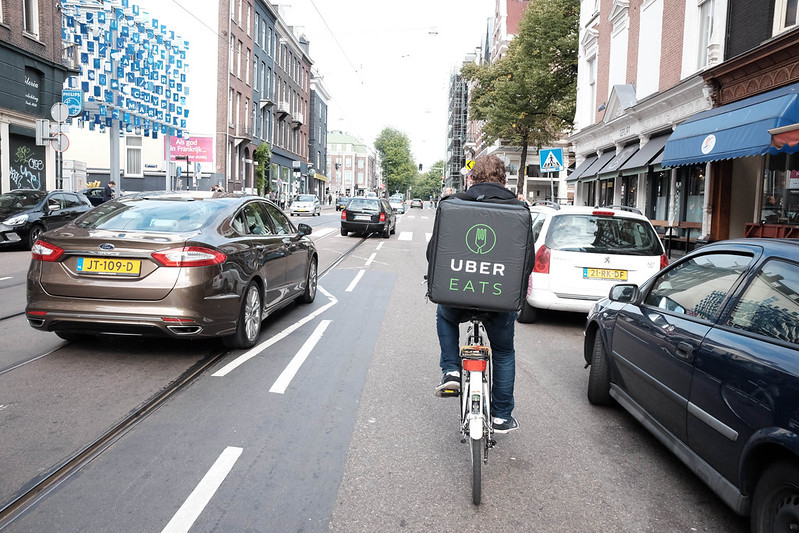
Photo: Franklin Heijnen (Flickr)
Report calls for transparency on gig economy algorithms
16 December 2021
by Christopher Carey
Employment and data protection laws are failing to protect gig economy workers from “unfair and opaque algorithmic management”, according to a new study from UK non-profit Worker Info Exchange (WIE).
The report – Managed by Bots: Data Driven Exploitation in the Gig Economy – claims that legally required explanations from firms are often “incomplete, inconsistent, and unreliable”, and that “disproportionate surveillance by gig platforms is resulting in an unaccountable expansion of law enforcement access to personal data”.
“The many worker cases we document in this report make it undeniably clear that the harms of algorithmic management are real and affect the most vulnerable,” said Cansu Safak, Lead Report Author at Worker Info Exchange.
“Gig platforms are collecting an unprecedented amount of data from workers through invasive surveillance technologies.
“Every day, companies make allegations of ‘algorithmic wrongdoing’ which they do not offer any evidence for.
“They block and frustrate workers’ efforts to obtain their personal data when they try to defend themselves – this is how gig platforms maintain exploitative power.”
Transparency
Seven firms that employ gig workers in the UK – Uber, Just Eat, Amazon Flex, Free Now, Bolt, Ola and Deliveroo – are referenced in the report, which claims there is little or no redress when wrong decisions are made and that platforms are not explaining how algorithms are assessing workers. Cities Today has contacted the companies for comment.
A Bolt spokesperson said: “Like all effective platform businesses, Bolt uses technology to help improve earnings opportunities for drivers, provide a quality service for customers and keep our platform as safe as possible.
“Our business has been built around offering the fairest, most transparent service to drivers and no contract is ever terminated without thorough human review.”
The report noted that although there have been some legal successes for gig workers in 2021 – including the UK Supreme Court’s decision in February that Uber must classify its drivers as workers rather than self-employed individuals – it can take significant resources to seek remedy through the courts.
In October, the App Drivers & Couriers Union (ADCU) launched an employment tribunal case citing “harassment related to race, victimisation and indirect race discrimination,” following the dismissal of an Uber driver and an Uber Eats courier due to what Uber says were failed checks by its facial recognition technology.
Yaseen Aslam, President of the ADCU, said: “Our union has been overwhelmed with casework from workers who were summarily dismissed by gig economy bosses after unsubstantiated allegations were made based on questionable surveillance data and opaque automated decision-making systems.
“It is crystal clear that workers need greater algorithmic transparency and far better protection from unfair dismissal than they currently have.”
EU directive
Last week, EU lawmakers formally proposed legislation for the gig economy to improve conditions for platform workers across the bloc – which includes taking steps to drive algorithmic accountability.
Legislators also want to improve visibility and ‘traceability’ of platform work by bringing in obligations for firms to declare work to authorities at a national level, to support enforcement of legal requirements.
According to the European Commission, approximately 5.5 million workers across the EU’s 27 member states have been misclassified as self-employed instead of as employees with benefits and protection, such as accident insurance.
The WIE claims the UK government is lagging behind in gig worker protections however, saying recent proposals from the UK Government Department for Digital, Culture, Media & Sport will “hobble access and transparency rights while stripping away current protections from automated decision-making”.
Last month the UK’s Trades Union Congress (TUC) published research which revealed that over four million people in England and Wales now work for gig economy platforms at least once a week – almost triple the amount in 2016.
The report alleged poor working conditions in the sector, and called for a right of access to workplaces for unions, which would also include a digital right of access to make algorithmic decision-making by platform employers more transparent.
Image: Franklin Heijnen (Flickr)










